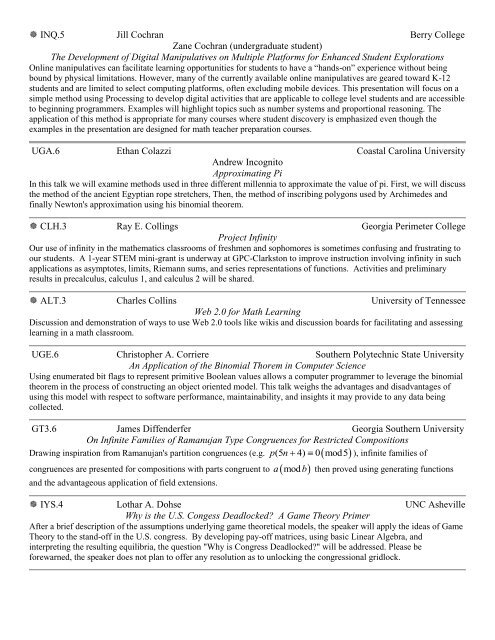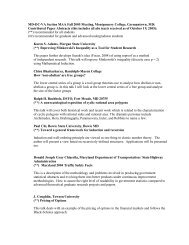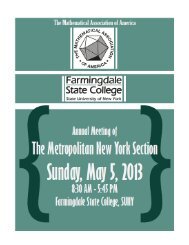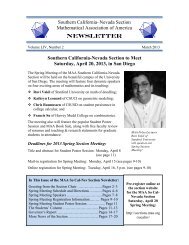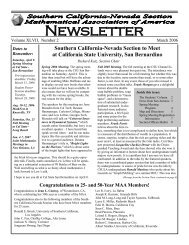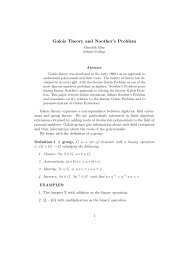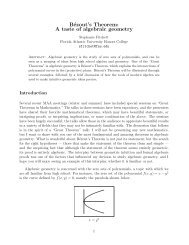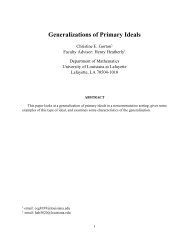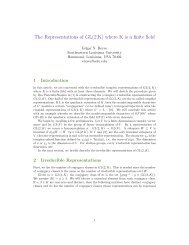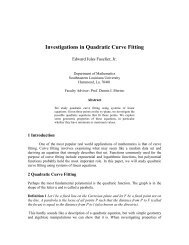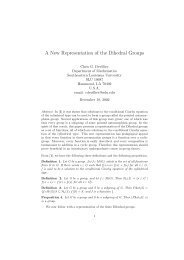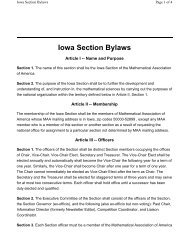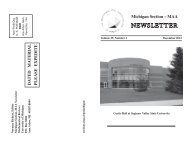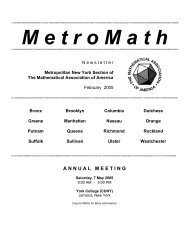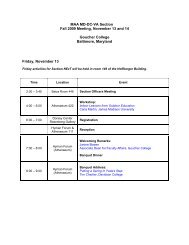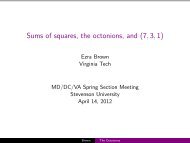Presentation Abstracts - MAA Sections
Presentation Abstracts - MAA Sections
Presentation Abstracts - MAA Sections
Create successful ePaper yourself
Turn your PDF publications into a flip-book with our unique Google optimized e-Paper software.
INQ.5 Jill Cochran Berry College<br />
Zane Cochran (undergraduate student)<br />
The Development of Digital Manipulatives on Multiple Platforms for Enhanced Student Explorations<br />
Online manipulatives can facilitate learning opportunities for students to have a “hands-on” experience without being<br />
bound by physical limitations. However, many of the currently available online manipulatives are geared toward K-12<br />
students and are limited to select computing platforms, often excluding mobile devices. This presentation will focus on a<br />
simple method using Processing to develop digital activities that are applicable to college level students and are accessible<br />
to beginning programmers. Examples will highlight topics such as number systems and proportional reasoning. The<br />
application of this method is appropriate for many courses where student discovery is emphasized even though the<br />
examples in the presentation are designed for math teacher preparation courses.<br />
UGA.6 Ethan Colazzi Coastal Carolina University<br />
Andrew Incognito<br />
Approximating Pi<br />
In this talk we will examine methods used in three different millennia to approximate the value of pi. First, we will discuss<br />
the method of the ancient Egyptian rope stretchers, Then, the method of inscribing polygons used by Archimedes and<br />
finally Newton's approximation using his binomial theorem.<br />
CLH.3 Ray E. Collings Georgia Perimeter College<br />
Project Infinity<br />
Our use of infinity in the mathematics classrooms of freshmen and sophomores is sometimes confusing and frustrating to<br />
our students. A 1-year STEM mini-grant is underway at GPC-Clarkston to improve instruction involving infinity in such<br />
applications as asymptotes, limits, Riemann sums, and series representations of functions. Activities and preliminary<br />
results in precalculus, calculus 1, and calculus 2 will be shared.<br />
ALT.3 Charles Collins University of Tennessee<br />
Web 2.0 for Math Learning<br />
Discussion and demonstration of ways to use Web 2.0 tools like wikis and discussion boards for facilitating and assessing<br />
learning in a math classroom.<br />
UGE.6 Christopher A. Corriere Southern Polytechnic State University<br />
An Application of the Binomial Thorem in Computer Science<br />
Using enumerated bit flags to represent primitive Boolean values allows a computer programmer to leverage the binomial<br />
theorem in the process of constructing an object oriented model. This talk weighs the advantages and disadvantages of<br />
using this model with respect to software performance, maintainability, and insights it may provide to any data being<br />
collected.<br />
GT3.6 James Diffenderfer Georgia Southern University<br />
On Infinite Families of Ramanujan Type Congruences for Restricted Compositions<br />
p(5n4) 0 mod5 ), infinite families of<br />
Drawing inspiration from Ramanujan's partition congruences (e.g. <br />
congruences are presented for compositions with parts congruent to amod<br />
<br />
and the advantageous application of field extensions.<br />
b then proved using generating functions<br />
IYS.4 Lothar A. Dohse UNC Asheville<br />
Why is the U.S. Congess Deadlocked? A Game Theory Primer<br />
After a brief description of the assumptions underlying game theoretical models, the speaker will apply the ideas of Game<br />
Theory to the stand-off in the U.S. congress. By developing pay-off matrices, using basic Linear Algebra, and<br />
interpreting the resulting equilibria, the question "Why is Congress Deadlocked?" will be addressed. Please be<br />
forewarned, the speaker does not plan to offer any resolution as to unlocking the congressional gridlock.


